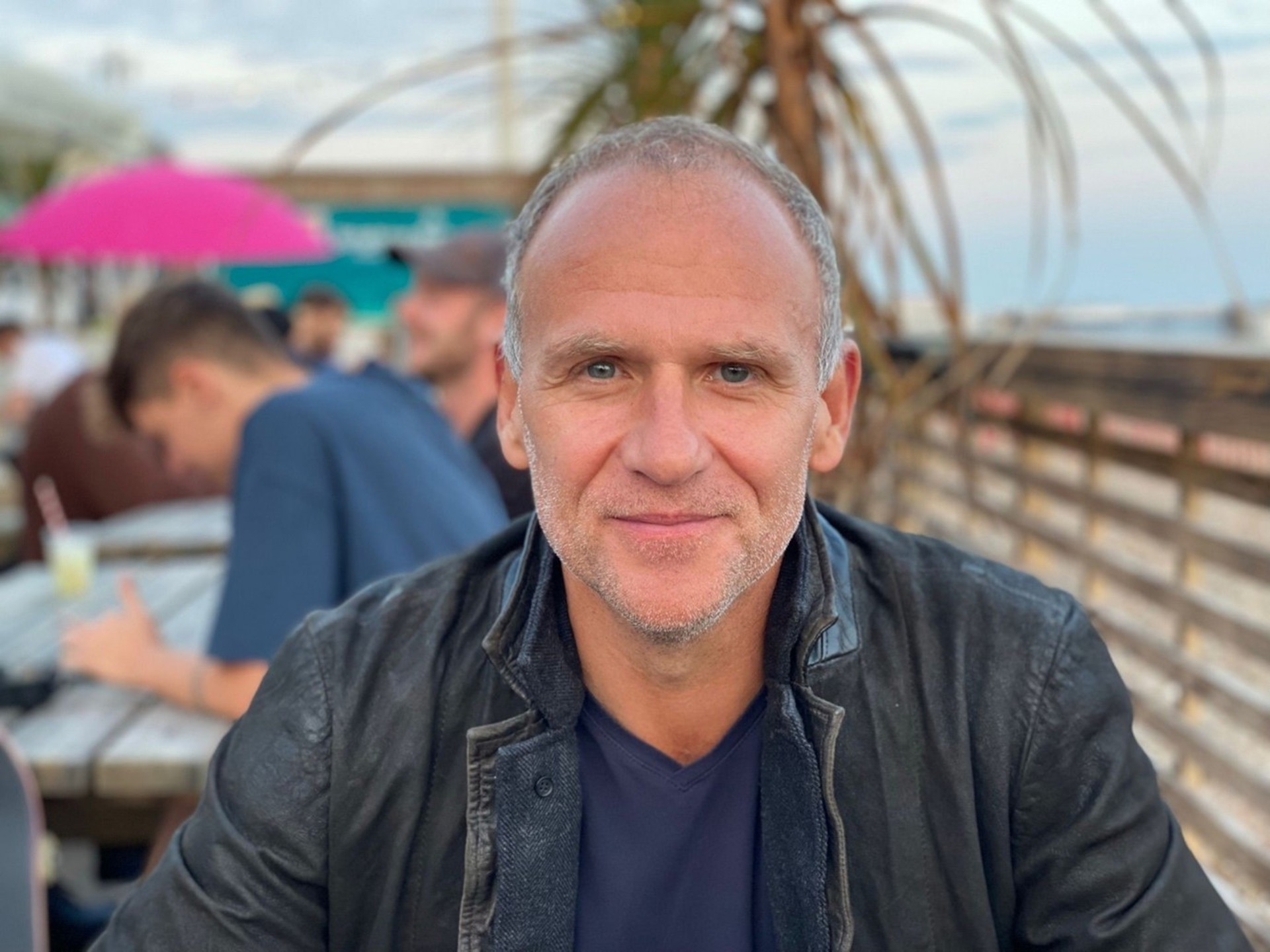Frontier’s Laura Petschnig & Kalina Kasprzyk speak with Dave Lewis, for the sixth conversation in our innovation interview series.
Dave spent 28 years at Unilever and then 6.5 years as CEO at Tesco. Since leaving Tesco he has become the Chair of the WWF in the UK, Chair of XLinks (a renewable energy business), a Non Exec Director for PepsiCo and is the Chair designate for the GSK Consumer Health business Haleon. Dave is an adviser to Arrival Education and Blume Private Equity and a Trustee of the Leverhulme trust.

Laura Petschnig: How important has innovation been in the businesses and industries you have been involved with?
Dave Lewis: Throughout my career, I have always worked with businesses where innovation has been the lifeblood of the business.
The critical thing is to understand that when we talk about innovation, it's not just products or technological breakthroughs. It's also around operational practices and processes. So, the ability to keep reinventing yourself, to improve, to modify, sometimes to radically change, is actually something that needs to be present in absolutely every organisation.
Kalina Kasprzyk: What is driving how and where innovation happens? Is it the economic model of a business or the individuals in charge, the corporate culture etc.?
Dave Lewis: The most important thing in all customer-facing businesses is starting with real customer insights. So you start with the end in mind, and then you're saying, ‘let me identify an opportunity to serve that person better to add value to that relationship’. Then you’re thinking: How can I make that work within the economic model of this business? Can we afford it? Does it fit? The economic model has a very important role to play at that stage, but also have to be prepared to challenge it.
Some of the best innovations I've ever seen completely reinvented the economic model of the business that created it. It's harder, but many industries have had to move from product delivery to service delivery. Over time that redefines the whole economic model of that business.
Laura Petschnig: Is there an example that you have in mind?
Dave Lewis: In the Tesco example, people would traditionally say we were a trading business. We buy it for X, we sell it for X plus, and we hope to make a small margin on that transaction. That's a very clear product retail business model.
When you focus on service and relationship, or ‘serving Britain’s shoppers a little better every day’ in the case of Tesco, then you start approaching things differently. For example, I'm really interested in a particular customer and I know about her grocery shopping, but she is also a bank customer who happens to be a Tesco mobile customer. These are three product interactions, but actually, it’s the same person.
This is where concepts of the ‘lifetime value’ of customer relationships start to come in. Am I prepared to change the economic model of either one of those three businesses in order to enhance the total customer relationship? That could mean going beyond the optimised economic model for one of these businesses but, in doing so, adding real lifetime value to the customer relationship. This thinking leads to Clubcard pricing and Clubcard plus.
Kalina Kasprzyk: How easy is that in practice when you have a business that's set up with different divisions, sub-businesses and incentives?
Dave Lewis: It can be difficult. By its very nature, innovation means change and pushing against the status quo. So, you have natural inertia at different levels – individual, departmental, hierarchical. That inertia in part tries to protect the economic model. That’s not always a negative, but it’s vital to counter that inertia sometimes if you want to add real value via innovation.
Laura Petschnig: What you're describing is what some people call the innovator’s dilemma - the inertia in an established business that has revenues to protect. How do you see that playing out in practice? Do established companies eventually win, or are disruptors a real threat?
Dave Lewis: There are notable examples where disruptors have come in and completely redefined a market. But I think the statistics would show that an ‘innovative incumbent’ tends to win. These incumbents are prepared to ‘self-disrupt’, and in doing so, they create barriers for new entrants.
Kalina Kasprzyk: We talked a lot about business models driving innovation. But how much influence do leadership and culture have?
Dave Lewis: I think leadership is as important as the right allocation of resources. To innovate, leaders need curiosity, a pursuit of excellence, and a willingness to define parameters which go beyond what hitherto people thought was practical or achievable. You also need to be slightly paranoid about missing something or becoming complacent!
You also need to set out the right processes to ‘break out’ of business as usual. Separate teams, separate capital, separate parameters for investment and return. This removes the inertia and encourages leaders to be challenging the existing model. Leadership invites these separate teams to benchmark against the best in the world.
These innovation teams can then go and create something new because there is little in jeopardy. Once you find a new model/product/service, you pick it up and bring it back into the wider business. Again, this is not easy and requires committed leadership and an innovative culture.
Laura Petschnig: If you flip that around, does that mean you don't need an innovation culture across the whole business, but instead, you need the vision to break out at the right points in time and put the right people in there? Is that too simplistic?
Dave Lewis: No, it's not too simplistic. But I would say it is a bit more nuanced. You do need an appreciation of innovation across the organisation. But you need that to be much deeper, more specialised and focused in a few key places.
Retaking the Tesco example, you need the store managers to appreciate how innovation can add value to the customer, even though they don't spend the majority of the time developing new innovative propositions.
Kalina Kasprzyk: How do you see the role of failure in innovation?
Dave Lewis: It goes back to behaviour and leadership. Failure needs to be recognised and learned from. But some businesses like to hide their failures.
Let’s take Jack’s as an example, a discount store chain launched by Tesco in 2018 set up to rival stores such as Lidl and Aldi. In the context of the Tesco P&L, investing £20 million was completely affordable, even if it sounds like a high investment for a trial.
Now, three years later, the stores have been closed, but actually, Jack’s more than paid for itself because of the lessons learnt that were applied to the larger Tesco operations. Innovations were introduced in Jack’s that would never have been tried across Tesco stores. The financial results were impressive, but the impact on the culture of innovation was even more significant.
Laura Petschnig: How well do you think businesses are doing this?
Dave Lewis: There are some good examples of businesses that celebrate failure. I've been in organisations that have parties to recognise the failures and the ‘burning’ of projects that didn't work. Some people think that's going too far.
I've also been in other organisations where nobody wants to even speak the name of the failed project. Everybody was trying to bury and forget it.
I find the best approach is somewhere in between. You should recognise that with all innovation there's risk and some of it doesn't work. As long as you take the lessons and share those broadly and you don't make the same mistakes twice – then you can be comfortable with some failures.
Kalina Kasprzyk: Have you seen many cultural differences in how businesses innovate across different countries and continents?
Dave Lewis: I've been fortunate to live and work in most regions of the world, and to experience the diversity of cultures has been a privilege. There are clear differences in how people respond to ideas and innovations and global businesses need to be sensitive to this.
What is interesting is different companies facing the same global markets innovate completely differently. Consider the approach of L’Oreal, vs Unilever, vs Procter and Gamble. In the same categories, they approach innovation differently. So corporate culture impacts how firms innovate in global business, as cultures are more important than countries’ differences. It relates to an approach to innovation.
Laura Petschnig: Finally, how helpful is it to have someone (advisers, for example) from the outside come in and support innovation?
Dave Lewis: It's crucial. If you think about it, by its very nature, innovation is the ability to take on board different insights, different points of view, different perspectives, different angles, different possibilities; be they technical, be they scientific; but can you bring them in and craft them in a way that can add value to the business? Innovation is all about alternative perspectives.
You can't underestimate the role of ‘outsiders’ and I would always want an adviser to bring a different point of view. So, the ones that I like are the ones that come and challenge our thinking. I want honest, objective challenges because then they add some value, even if you disagree. You listen to it all and then you have to make a call.
Quick fire questions
If one thing was missing from most innovation portfolios today, it is…
…senior leadership capability.
If you want to create more incentives to innovate, you should…
…be creative of how you get some ‘skin in the game’ for innovators.
If you want to innovate faster, you need to…
…be brave.
If you want to create successful innovation partnerships you need to…
…trust.
If I could change one thing about how innovation works today, it would be…
…to judge innovation through a wider lens across different stakeholders to assess true economic value – for example, a way to make sure you capture sustainability appropriately.




